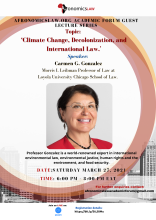ECA's mission is to deliver ideas and actions for an empowered and transformed Africa; informed by the 2030 Agenda and Agenda 2063. The mission will be guided by ECA's five new strategic directions which are advancing ECA's position as a premier knowledge institution that builds on its unique position and privilege to bring global solutions to the continent's problems and take local solution to the continent; developing macroeconomic and structural policy options to accelerate economic diversification and job creation; designing and implementing innovative financing models for infrastructure, and for human, physical and social assets for a transforming Africa; contributing solutions to regional and transboundary challenges, with a focus on peace security and social inclusion as an important development nexus; advocating Africa's position at the global level and developing regional responses as a contribution to global governance issues.
